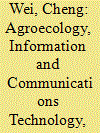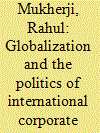| Srl | Item |
| 1 |
ID:
175116


|
|
|
|
|
| Summary/Abstract |
As a bottom-up, grassroots paradigm for sustainable rural development, agroecology is particularly promising for smallholders in many countries in sub-Saharan Africa. However, by adopting agroecology, smallholders will be challenged to take on new perspectives and compile and integrate different sourced information to innovate. Today’s fast evolving information and communications technology in sub-Saharan Africa represents great opportunities for rural populations to enhance the adoption and success of agroecology and to address their daunting challenges simultaneously while conserving, protecting and enhancing natural resources. Agroecology combined with information and communications technology will probably be smallholders’ “precision agriculture” in many developing countries to enhance their food security and livelihood.
|
|
|
|
|
|
|
|
|
|
|
|
|
|
|
|
| 2 |
ID:
052505


|
|
|
|
|
| Publication |
April 2004.
|
| Summary/Abstract |
Globalization spurred by information and communications technology could erode the ability of states to tax corporations. Digitization makes it easy to penetrate foreign markets without the need for physical presence in the buyer's country. This phenomenon has generated debates on the salience of source- versus residence-based taxation, and the definition of permanent establishment. There is no multilateral organization governing international corporate taxation. The article notes both the inadequacy of unilateral approaches and the need for a global approach to setting and monitoring standards. Consistent with the interests of producer developing countries like India, it commends the vitality of source-based principles and the traditional conception of permanent establishment. India's interests are similar to those of many capital-scarce producer countries exporting their services over the Internet. Moreover, they are not antithetical to the interests of capital-abundant countries. The issue area is in dire need of global governance.
|
|
|
|
|
|
|
|
|
|
|
|
|
|
|
|
| 3 |
ID:
165599


|
|
|
|
|
| Summary/Abstract |
The transition from Fordism to the knowledge economy in the world’s advanced democracies was underpinned by the revolution in information and communications technology (ict). The introduction and rapid diffusion of ict pushed up wages for college-educated workers with complementary skills and allowed top managers and CEOs to reap greater rewards for their own talents. Despite these common pressures, income inequality did not rise to the same extent everywhere; income in the Anglo-Saxon countries remains particularly unequally distributed. To shed new light on this puzzle, the authors carry out a panel data analysis of eighteen oecd countries between 1970 and 2007. Their analysis stands apart from the existing empirical literature by taking a comparative perspective. The article examines the extent to which the relationship between the knowledge economy and income inequality is influenced by national labor market institutions. The authors find that the expansion of knowledge employment is positively associated with both the 90/10 wage ratio and the income share of the top 1 percent, but that these effects are mitigated by the presence of strong labor market institutions, such as coordinated wage bargaining, strict employment protection legislation, high union density, and high collective bargaining coverage. The authors provide robust evidence against the argument that industrial relations systems are no longer important safeguards of wage solidarity in the knowledge economy.
|
|
|
|
|
|
|
|
|
|
|
|
|
|
|
|